Hyundai Tucson vs VW Touareg - Differences and prices compared
Compare performance (288 HP vs 462 HP), boot space and price (20900 £ vs 64300 £ ) at a glance. Find out which car is the better choice for you – Hyundai Tucson or VW Touareg?
Costs and Efficiency:
Price and efficiency are key factors when choosing a car – and this is often where the real differences emerge.
Hyundai Tucson has a decisively advantage in terms of price – it starts at 20900 £ , while the VW Touareg costs 64300 £ . That’s a price difference of around 43410 £.
Fuel consumption also shows a difference: Hyundai Tucson manages with 2.70 L and is therefore significantly more efficient than the VW Touareg with 5.20 L. The difference is about 2.50 L per 100 km.
As for electric range, the Hyundai Tucson performs distinct better – achieving up to 70 km, about 21 km more than the VW Touareg.
Engine and Performance:
Under the bonnet, it becomes clear which model is tuned for sportiness and which one takes the lead when you hit the accelerator.
When it comes to engine power, the VW Touareg has a distinct edge – offering 462 HP compared to 288 HP. That’s roughly 174 HP more horsepower.
In acceleration from 0 to 100 km/h, the VW Touareg is decisively quicker – completing the sprint in 5.10 s, while the Hyundai Tucson takes 7.50 s. That’s about 2.40 s faster.
In terms of top speed, the VW Touareg performs to a small extent better – reaching 250 km/h, while the Hyundai Tucson tops out at 204 km/h. The difference is around 46 km/h.
There’s also a difference in torque: VW Touareg pulls decisively stronger with 700 Nm compared to 379 Nm. That’s about 321 Nm difference.
Space and Everyday Use:
Cabin size, boot volume and payload all play a role in everyday practicality. Here, comfort and flexibility make the difference.
Both vehicles offer seating for 5 people.
In curb weight, Hyundai Tucson is clearly perceptible lighter – 1542 kg compared to 2059 kg. The difference is around 517 kg.
In terms of boot space, the VW Touareg offers distinct more room – 810 L compared to 620 L. That’s a difference of about 190 L.
In maximum load capacity, the VW Touareg performs minimal better – up to 1800 L, which is about 1 L more than the Hyundai Tucson.
When it comes to payload, VW Touareg distinct takes the win – 751 kg compared to 545 kg. That’s a difference of about 206 kg.
Who wins the race?
The Hyundai Tucson proves to be leaves the rival little chance and therefore becomes our DriveDuel Champion!
Hyundai Tucson is the better all-rounder in this comparison.

Hyundai Tucson
Costs and Consumption
View detailed analysis
Engine and Performance
View detailed analysis
Dimensions and Body
View detailed analysis
Hyundai Tucson
Hyundai Tucson marries bold, sculpted looks with a clever, roomy cabin that feels smarter than its price tag suggests. It's composed on the road, easy to live with day-to-day, and a sensible choice for buyers who want SUV style without the showroom theatrics.
details




VW Touareg
Volkswagen Touareg wraps a grown-up presence in a classy, well-appointed cabin that feels more like a premium saloon than an SUV. It glides with quiet composure, devours long journeys and tucks away clever tech that makes life easier whether you’re stuck in town or nipping off the beaten track.
details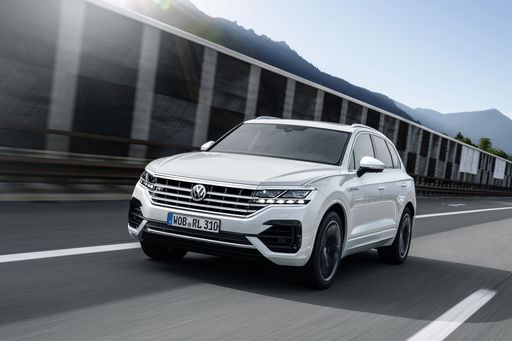
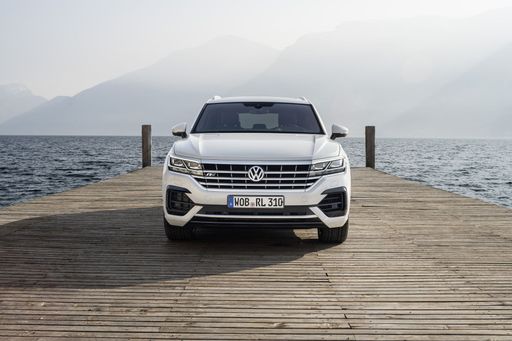
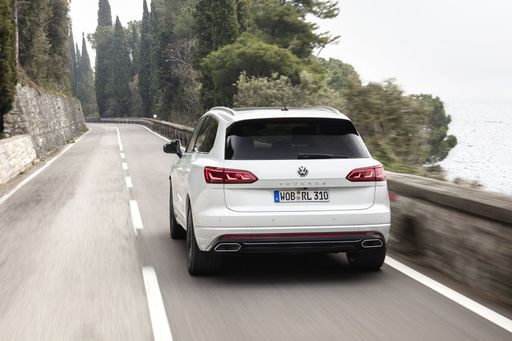
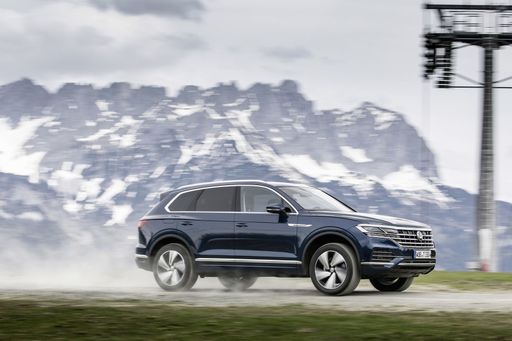
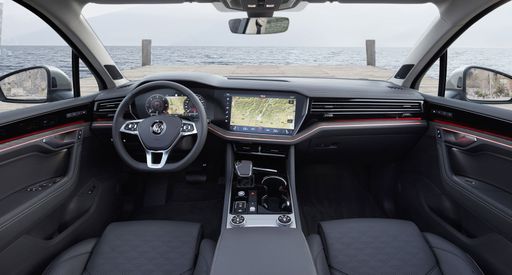
Costs and Consumption |
|
|---|---|
|
Price
20900 - 47900 £
|
Price
64300 - 88300 £
|
|
Consumption L/100km
2.7 - 7.6 L
|
Consumption L/100km
5.2 - 10.5 L
|
|
Consumption kWh/100km
-
|
Consumption kWh/100km
-
|
|
Electric Range
63 - 70 km
|
Electric Range
47 - 49 km
|
|
Battery Capacity
-
|
Battery Capacity
14.30 kWh
|
|
co2
62 - 172 g/km
|
co2
119 - 239 g/km
|
|
Fuel tank capacity
52 - 54 L
|
Fuel tank capacity
75 L
|
Dimensions and Body |
|
|---|---|
|
Body Type
SUV
|
Body Type
SUV
|
|
Seats
5
|
Seats
5
|
|
Doors
5
|
Doors
5
|
|
Curb weight
1542 - 1893 kg
|
Curb weight
2059 - 2470 kg
|
|
Trunk capacity
546 - 620 L
|
Trunk capacity
665 - 810 L
|
|
Length
4525 - 4535 mm
|
Length
4878 - 4902 mm
|
|
Width
1865 mm
|
Width
1984 mm
|
|
Height
1650 mm
|
Height
1693 - 1712 mm
|
|
Max trunk capacity
1795 - 1799 L
|
Max trunk capacity
1675 - 1800 L
|
|
Payload
518 - 545 kg
|
Payload
550 - 751 kg
|
Engine and Performance |
|
|---|---|
|
Engine Type
Petrol, Full Hybrid, Plugin Hybrid, Diesel MHEV
|
Engine Type
Petrol, Plugin Hybrid, Diesel
|
|
Transmission
Manuel, Automatic
|
Transmission
Automatic
|
|
Transmission Detail
Manual Gearbox, Dual-Clutch Automatic, Automatic Gearbox
|
Transmission Detail
Automatic Gearbox
|
|
Drive Type
Front-Wheel Drive, All-Wheel Drive
|
Drive Type
All-Wheel Drive
|
|
Power HP
136 - 288 HP
|
Power HP
231 - 462 HP
|
|
Acceleration 0-100km/h
7.5 - 11.6 s
|
Acceleration 0-100km/h
5.1 - 7.7 s
|
|
Max Speed
196 - 204 km/h
|
Max Speed
222 - 250 km/h
|
|
Torque
250 - 379 Nm
|
Torque
450 - 700 Nm
|
|
Number of Cylinders
4
|
Number of Cylinders
6
|
|
Power kW
100 - 212 kW
|
Power kW
170 - 340 kW
|
|
Engine capacity
1598 cm3
|
Engine capacity
2967 - 2995 cm3
|
General |
|
|---|---|
|
Model Year
2025
|
Model Year
2025
|
|
CO2 Efficiency Class
F, D, E, B
|
CO2 Efficiency Class
G, D
|
|
Brand
Hyundai
|
Brand
VW
|
What drive types are available for the Hyundai Tucson?
Available configurations include Front-Wheel Drive or All-Wheel Drive.




